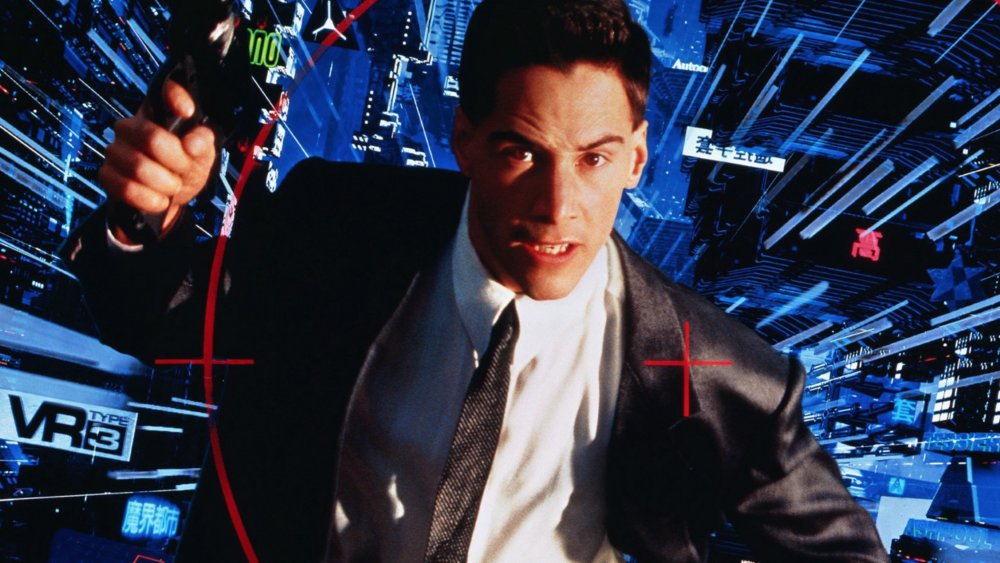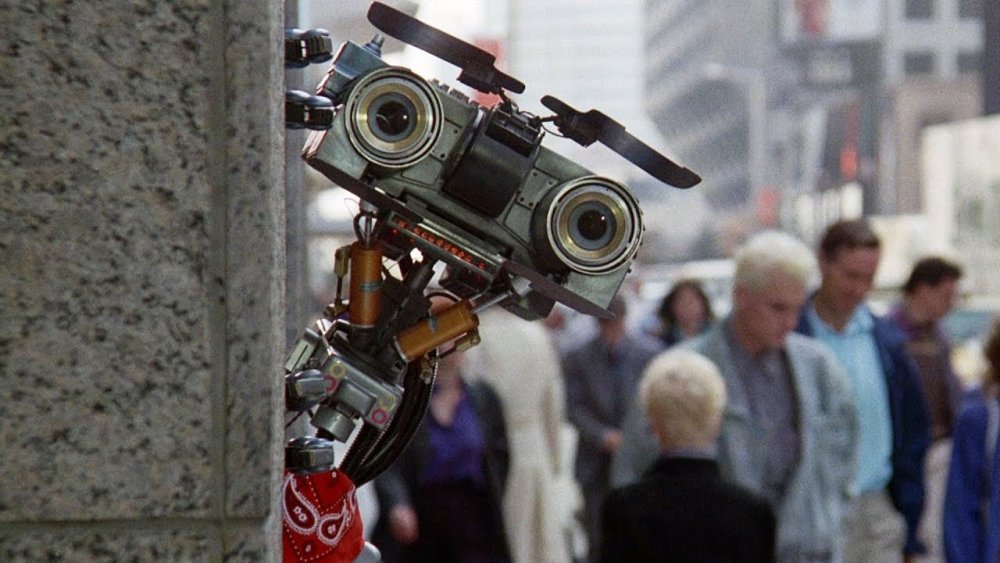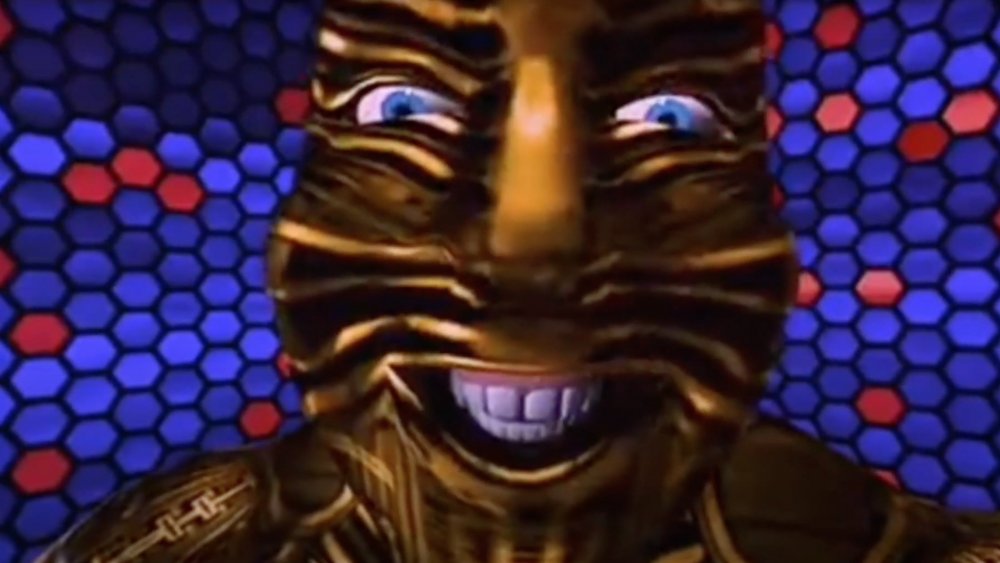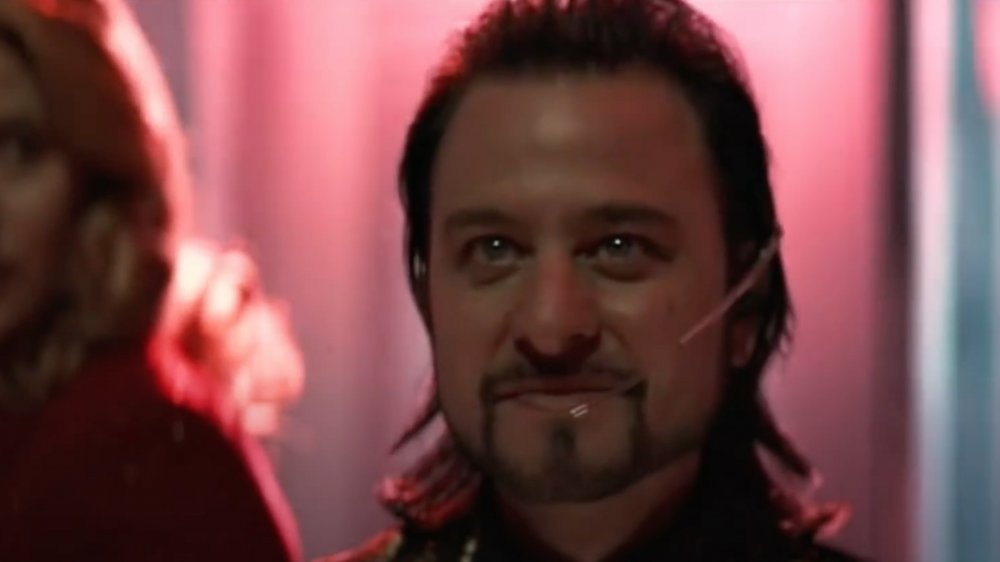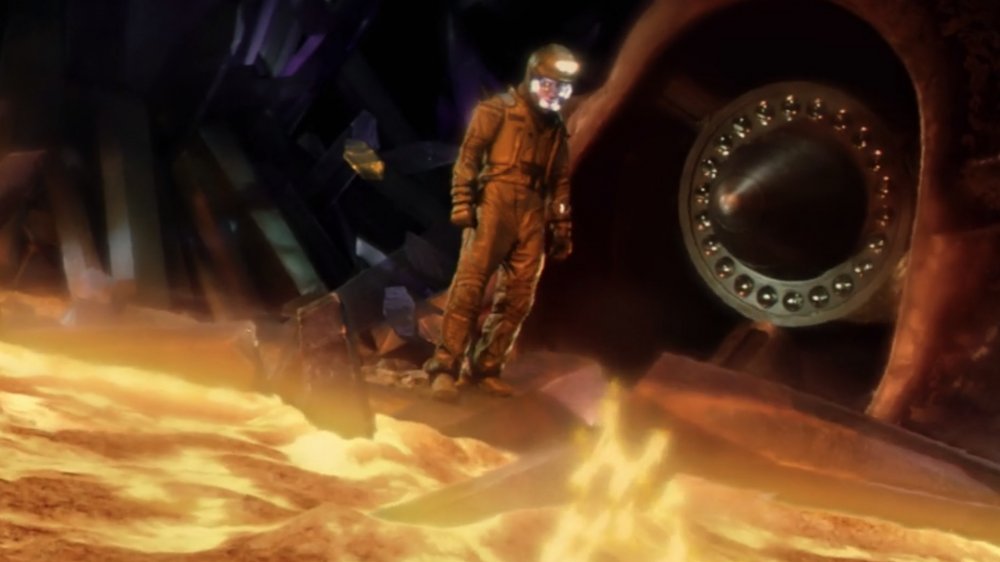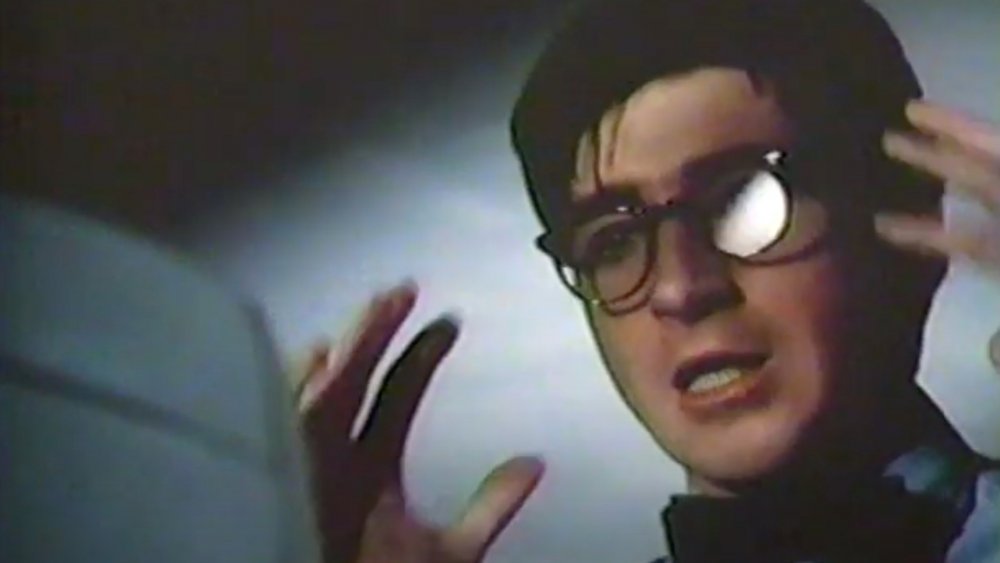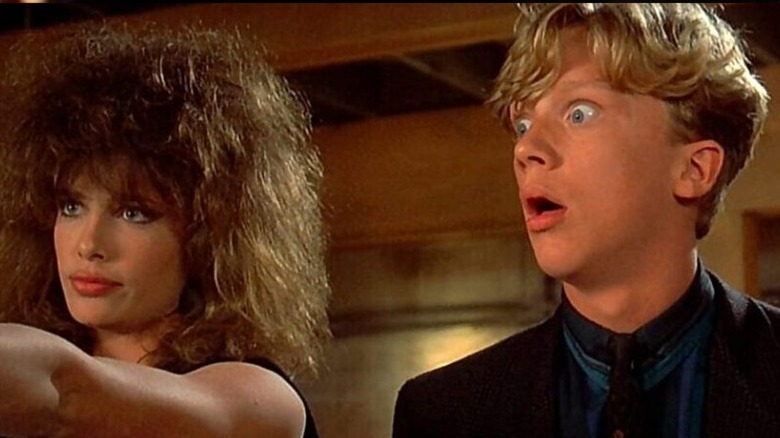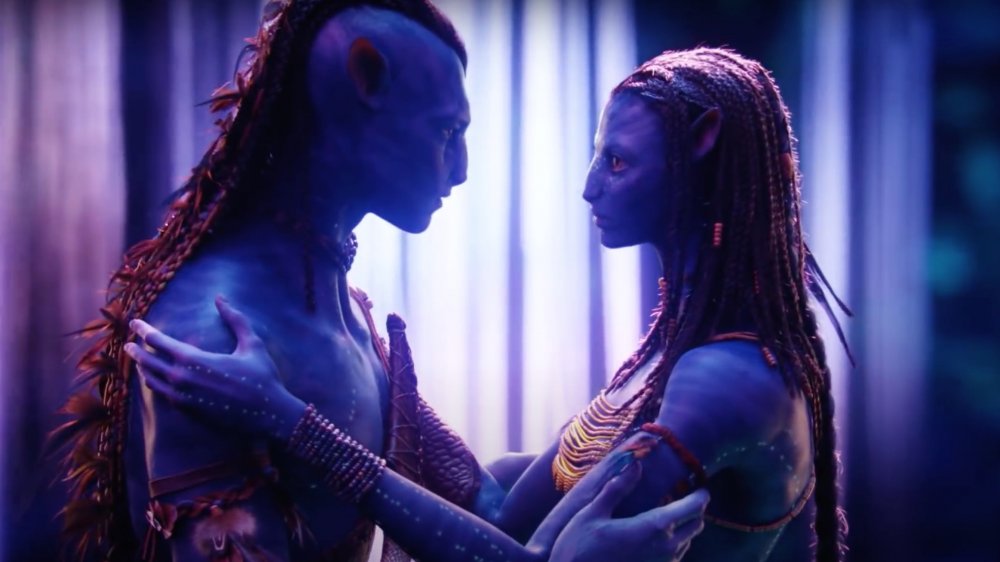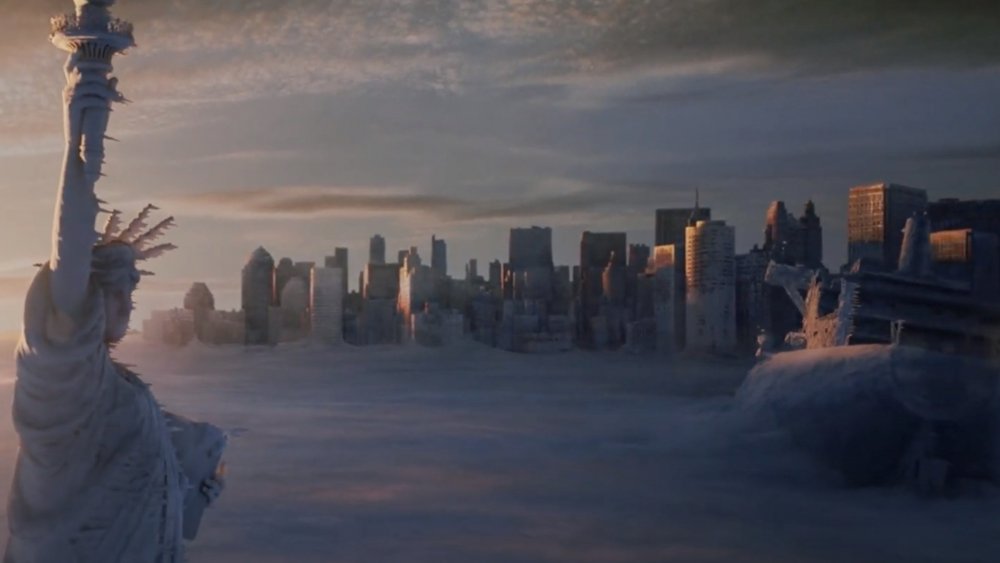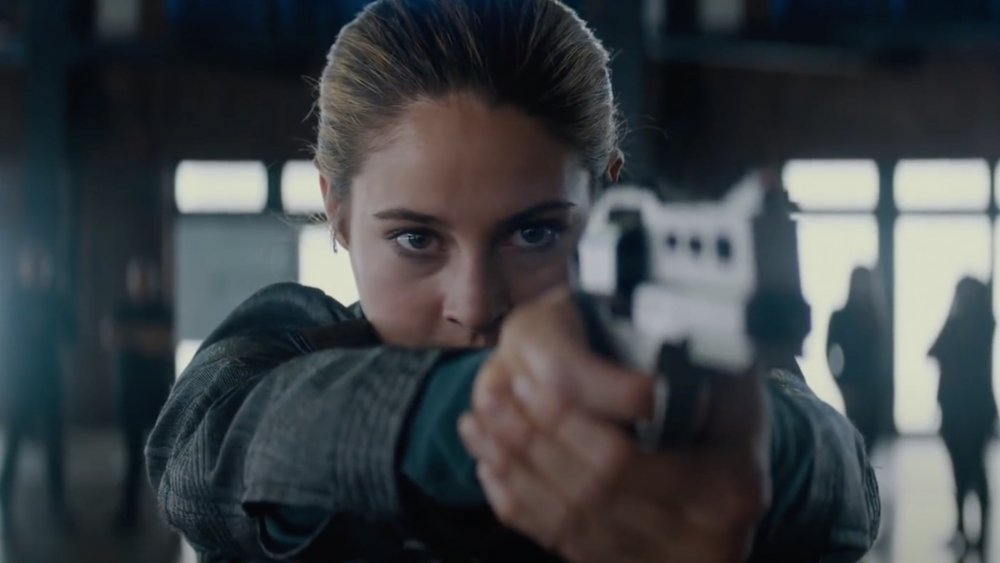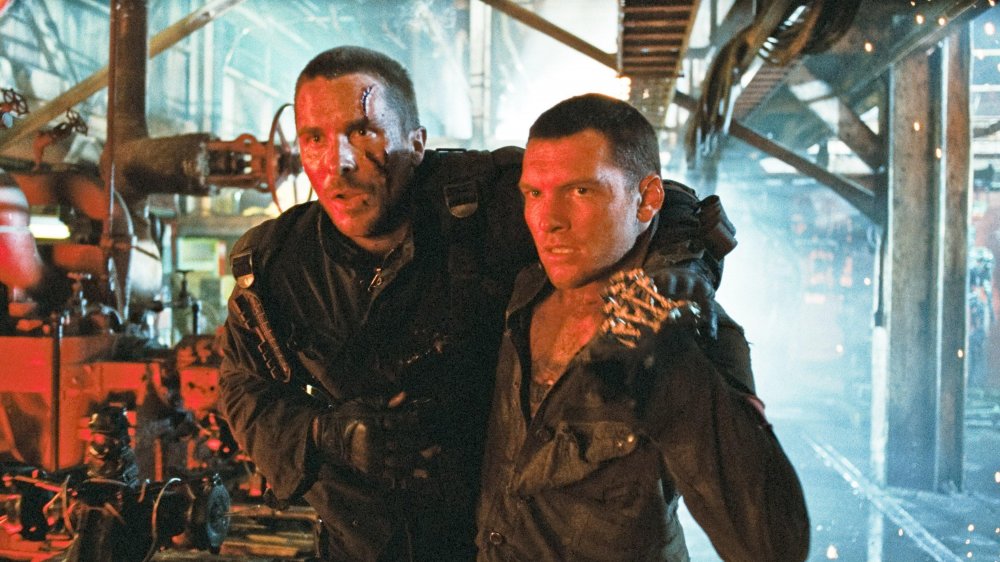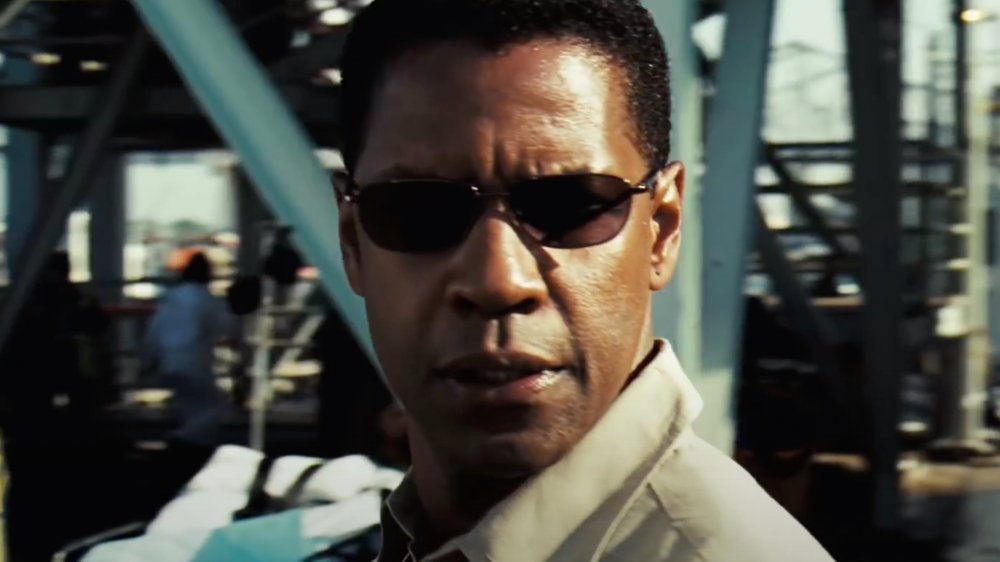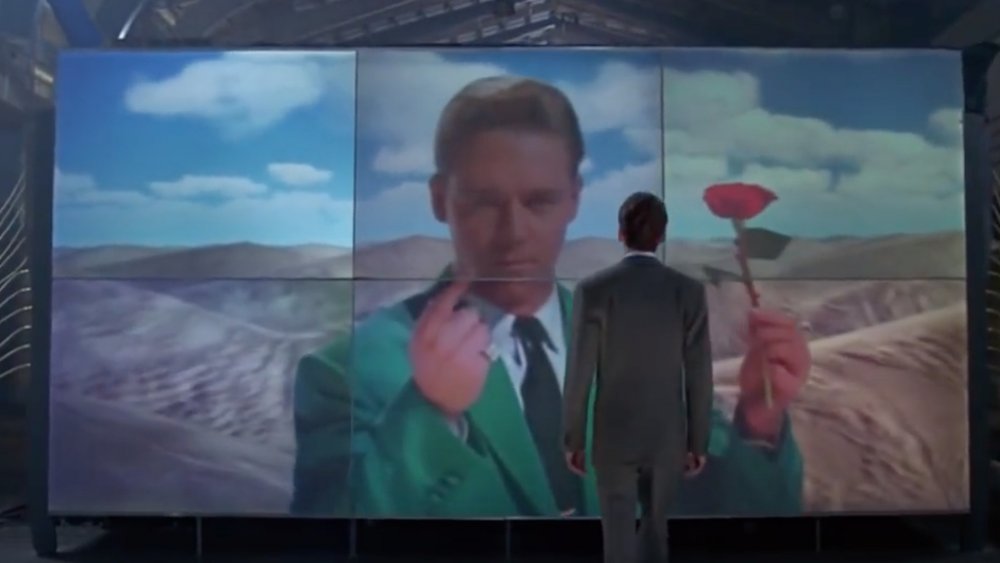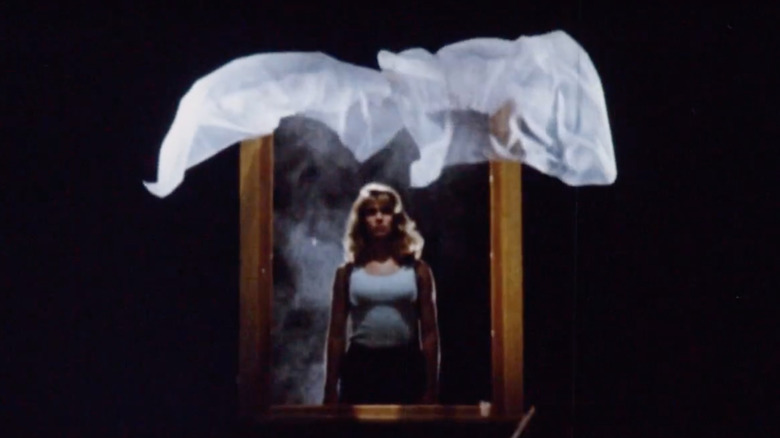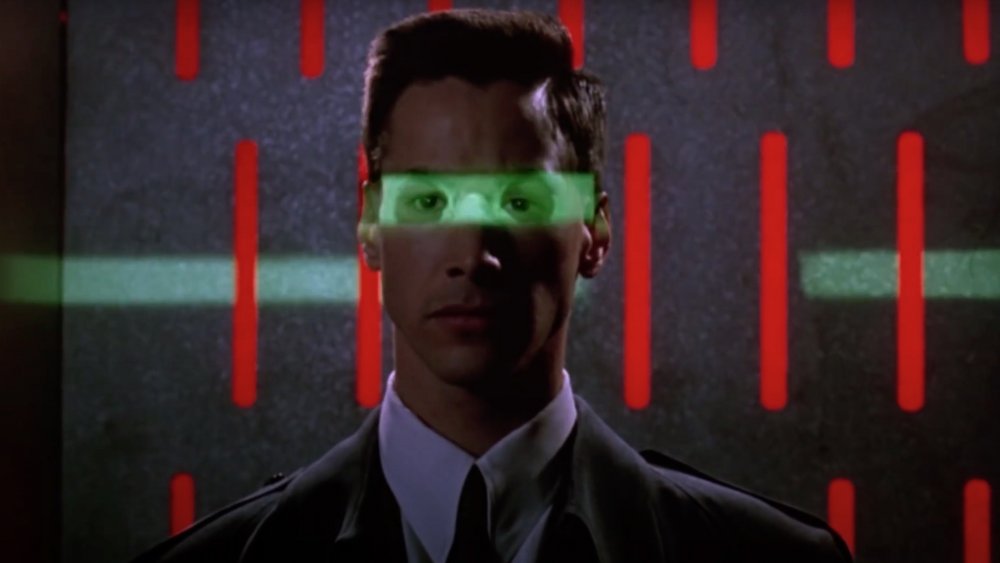Sci-Fi Movies That Have Aged Terribly
When it comes to aging, there's obviously a secret that Hollywood is keeping from the rest of us. Perhaps the denizens of Tinseltown spend all their time off-camera in stasis with vitamin drips. Whatever the secret, it's one that eludes one of our most treasured genres — science fiction.
Dreaming up what's possible for the future is inherently fun to watch. As time moves forward, we catch up to imaginations of the past, and it can be laughable to see what we thought today would be like. Sure, some movies age gracefully and maintain their whimsical attributes. But other times, as the world moves forward, a sci-fi film can get left behind in time and not in an endearing, mummified state. Instead, it continues to decay and rot as our perceptions change.
So what's up with these horribly dated science fiction films? In some instances, it's the future tech, while in others, everything about them is wrong. If you have a fond memory of some of these flicks, it's best to leave them as gems in your mind because these sci-fi movies have aged terribly.
Short Circuit is a sci-fi movie that doesn't get robots
In Short Circuit, a robot that looks as if it was assembled for a middle school science show gains sentience after being struck by lightning. The robot dons the name Johnny 5, escapes a military base, and finds itself at a caregiver's house where it begins learning about what it means to be alive. Sounds cute on paper, but watching it today will make you worry about how naive '80s audiences were.
The creators of the film had no idea how computer memory worked. They operated under the assumption that once a computer gets struck by lightning, your hardware gets upgraded to human memory levels. Plus, the robot looks like it was stolen from the set of E.T. and stripped of its adorable husk. Our memory banks recall the animatronic ramblings of Johnny 5 as humorous, but now, they're just plain annoying.
On top of all that, imagine the outrage today if an Indian scientist was played by white guy from Chicago. Fisher Stevens went to great lengths to immerse himself in the culture and be as accurate as possible, but it's highly unlikely that effort would merit a pass today.
The Lawnmower Man was disowned by Stephen King
In the 1990s, The Lawnmower Man took the new landscape of virtual reality and injected it with some horror, a la Stephen King. "Based" on the author's short story, the movie focuses on a man named Jobe who's subjected to VR experiments that grant him telepathic powers. However, the graphics here are laughable, and they don't even hold up as an endearing product of the time period, especially a cringe-worthy computer-animated love scene. It gets even worse when Jobe uploads himself into a mainframe, resulting in Pierce Brosnan's scientist character needing to dive in and face the monster he created. It's amusing at first ... and then it's just hard to watch.
The premise that a man could obtain supernatural powers by experiencing VR is so ridiculous that even comic book nerds at the time were rolling their eyes. It doesn't help any that we have more technology in our pockets now than Brosnan's scientist had in his whole dingy basement. Worse still, the movie has nothing to do with King's short story, aside from the fact that there's a man who mows lawns. It contains so little relation to the original story that King sued the production company to have his name removed from the film's credits and promotional campaign altogether.
Hackers doesn't understand computers
Angelina Jolie on rollerblades is quite mesmerizing, but it does little to save Hackers from all the technological faux pas. While real-life hackers love the film for accurately portraying the vibe surrounding hacker culture, many of the technological aspects haven't aged gracefully.
A lot of the hacking scenes are portrayed through a flurry of random film and television shots that don't have anything to do with what's happening. The first hacker battle scene is represented by a mechanical arm in a TV studio tape vault battling with another mechanical arm as the hackers fight over who gets to play what on the television. It's hard to swallow. Even harder to swallow is why you need to hack an entire system to pull a fire alarm. Or that the interior lighting for an entire office building would be linked up to a computer in 1995 and hacking it would allow you to spell out romantic gestures across the city skyline. Keep in mind that you can do a lot of this through a payphone. /run.program/eyeroll
The Core gets the science all wrong
The only thing that saves The Core from being a complete bomb is the cast, which includes Hilary Swank, Aaron Eckhart, and Stanley Tucci. The movie centers around a group of scientists taking a journey to the center of the Earth to kickstart the core, which has stopped spinning, resulting in the disappearance of Earth's protective magnetosphere. Don't worry though, it will hang around for a year or so while they figure stuff out.
As the characters are standing in a sparkling geode hundreds of miles below the Earth's crust, you may be asking yourself, "How are those flimsy suits withstanding the pressure when their ship needs to be made out of a mythical element to do so?" The questions keep pouring in. When a hole in our magnetic field appears and melts the Golden Gate Bridge, it's hard not to notice that none of the cars are melting. And in order to "restart" the Earth's center, they must time out several nuclear bombs to begin swirling the magma around the core. It doesn't take a PhD to know that detonating several nukes at the center of our Earth probably isn't going to end well. It's all pretty and fun, but it will give any scientist a brain aneurysm.
Electric Dreams hasn't aged well at all
It explains why our elders are so terrified of technology when you consider this 1984 thriller featuring a jealous computer. In Electric Dreams, an architect named Miles buys a computer to help him bring his grand ideas to life. The computer gains sentience when it overheats and our unwitting hero pours champagne on it to cool it off. (All these years later, we now know that alcohol has the opposite effect on self-awareness.) After coming to life, the computer becomes jealous of the neighbor girl who Miles is dating and begins taking over appliances around the house and assaulting Miles, even going as far as to cancel his credit cards and register him as a dangerous criminal.
Given that the computer isn't connected to anything in the world, there's no way this would even work, especially not in 1984. The World Wide web didn't even exist yet, and Edgar is reaching out to devices all over town and wreaking havoc. Plus, it's a bold statement to claim that the first thing a computer would do after becoming sentient is be jealous of a man's lover.
Weird Science is really outdated
John Hughes, nerds, and a young Robert Downey Jr. with a bra strapped to his head — what could possibly be wrong with Weird Science? There are so many outdated aspects of this 1985 film that it's not even laughable. The movie's frat boy vibe was really out of character for the director, and it makes the movie nearly unwatchable today. After all, the stars are two nerdy boys who create a magic doll in order to convince other girls of their sexual prowess ... which works by the way. They get the girls they lusted for, and the woman they created continues to help other boys in their school trick girls into liking them.
In addition to the whole Frankenstein she-bot problem, the film's portrayal of technology makes it hard to watch. At one climactic moment, an electrical surge shoots open washing machine doors and has dogs sitting on ceilings. Not to mention that we need to buy into the fact that the boys create a girl with their computer, some wires clamped onto a Barbie doll, and a single keystroke that hacks into a powerful, government computer mainframe that's guarded by a man who manually types "access denied" into his keyboard in response to any server queries.
No one cares about Avatar
Avatar is the second highest-grossing movie of all time, and its motion-capture technology revolutionized the movie industry and paved the way for a world of superheroes. James Cameron developed a dazzling world for our eyeballs to soak up. So ... why is it that no one cares?
It's truly baffling that a movie with such huge financial success has had zero cultural footprint. Most people wouldn't be able to name any of the characters in Avatar, despite having seen it in theaters three or more times. All these years later, the lackluster story has been compared to the likes of FernGully: The Last Rainforest, and it's left us with nothing more than pretty images. And that's the problem.
What makes a movie a classic years later is an intriguing story and memorable dialogue. The packaging around that story is just icing, and a dry, chalky interior isn't going to have us coming back for more. We have way too much eye candy nowadays to be loyal to just any starry sky that crosses our path. Despite all this, we can't help but remember how we felt watching Avatar for the first time, even if we don't remember everything that happened in the film.
The 'science' in The Day After Tomorrow has aged terribly
We would argue that climate change skeptics who watched The Day After Tomorrow latched on to the sci-fi aspects of this 2004 disaster flick hard and still haven't let go. Even Dennis Quaid's gigantic smile can't stop us from rolling our eyes as the characters try to outrun a cold wind that freezes people in place. Given that we're currently trying to convince a room full of crypt keepers that we need to stop drilling holes in our planet, it can be frustrating to watch this film's portrayal of climate change.
In The Day After Tomorrow, a massive shift in the Earth's weather develops three superstorms across the Northern Hemisphere that funnel ice cold air through their cores and unleash tsunamis and tornadoes across the globe. The result is half the world being plunged into an ice age overnight. The film takes what could happen over the course of several years and condenses it into a few days of Hollywood heroism. It's mind-numbing in all the wrong ways.
Divergent was forgotten before it could finish
After the massive success of The Hunger Games, studios were clamoring for sci-fi loves stories written for young adults. Divergent was supposed to be the new hot thing, and its studio poured a massive budget into it. It seemed like a fun ride at the time, but revisiting the film shows that it hasn't aged gracefully. Unfortunately, it's all stuff we've seen numerous times. We've got a hero in a dystopian future, got it. It feels like something is wrong, sure. Okay, they're going to fight against their oppressors. This all feels familiar.
The fight against the system is always fun, but we would enjoy it more if Divergent didn't mangle it until we just didn't care anymore. The story doesn't seem to be heading anywhere, and the stakes don't seem very high. It's hard to get on board with a revolution when you don't feel like anything is on the line. Worse still, for future films, the studio pushed back dates and even tried to jump the series over to a TV movie. All these efforts fell to the wayside as audiences moved on and plans for the final film of the series were canceled. Those hoping for closure are unlikely to get it.
Terminator Salvation muddied up the franchise
When Terminator Salvation was announced, everyone was feverish with anticipation of more Terminators and also about Batman himself, Christian Bale, as John Connor! Not to mention that sexy trailer with the Nine Inch Nails song playing over a gritty futurescape, complete with giant machines snatching resistance fighters.
However, the movie makes a choice that seems like a logical direction for The Terminator franchise ... at first. They step into the future and show humanity battling the machine hive mind. While that might seem cool, this choice muddies up a timeline that had already become murky after the franchise's third installment. Crazier still, they even shift the hero focus from John Connor himself — the very core of The Terminator series.
After Terminator Salvation, screenwriters immediately negated most of the film's storyline developments. Added to the film's lack of foresight is the fact that this future was in the year 2018. There may not be young bionic Schwarzeneggers running around today, but with how the world is panning out these days, we'd say they didn't make the landscape chaotic enough.
Deja Vu is a sci-fi movie with a ridiculous premise
You may remember this 2006 Denzel Washington flick, or maybe you aren't sure. You might think you saw it but didn't remember until just now. It's okay if your memory of Deja Vu is a little hazy. The film earned $180 million and then quickly faded from everyone's memory. The irony is astounding that we were engrossed by Deja Vu and then quickly shoved it into the back of our minds.
This sci-fi film is based around the premise of a device that can peer days into the past for a single viewing of events anywhere in its radius. Denzel Washington joins a crew (including a barely seen Val Kilmer) to reveal the terrorists behind the bombing of a ferry in New Orleans. The entire premise is so preposterous that you have trouble looking away from it. That's especially true when Denzel is speeding through the city in a VR helmet while simultaneously viewing the past and navigating the present. It's a story that you think might gets better with time, but it only makes you wish you could get that time back.
Virtuosity brings a VR simulation to life, unfortunately
The ability to sit in our living rooms with VR goggles has turned this '90s sci-fi thriller into a comedy. There's almost nothing accurate about Virtuosity's depiction of technology, from the 8-track cartridges that house each AI system to the alien cocoon that spawns Russell Crowe's demented VR simulation. Once the sadistic program, known as SID, is brought to life, he retains the abilities he had in the virtual world. He can regenerate by touching technology — or anything really — and his face distorts and morphs with his moods. There isn't a single part of Virtuosity that contains any technological accuracy. The only part you believe is that Russell Crowe is having way too much fun.
As far as visions of the future goes, it feels adolescent. When it was first released, most of us had fun watching two budding movie stars duke it out in dystopia, with Crowe up against Denzel Washington's detective. Now that we have over two decades of other Washington and Crowe movies to enjoy, there's little reason to subject ourselves to all of Virtuosity's inaccuracies. If you remember it being good, best to leave it your mind that way.
Deadly Friend eludes cult status
One thing is for sure, technology was absolutely terrifying to the '80s generation. In Deadly Friend, the main character brings his brain-dead girlfriend back to life by implanting a microchip in her head. The microchip came from his protective robot friend who was recently destroyed. Luckily, this chip can interface with the human mind because of course it can. We all know that a computer motherboard and the human brain are interchangeable.
Naturally, the new computer components in his girlfriend turn her evil, and she begins killing anyone who threatens the love of her life. The death scenes are gratuitously gory and manage to evade even being amusingly schlocky. There's a special note that some terrible movies are able to hit that shifts them into endearing comedy, and Deadly Friend isn't one of them. The big takeaway from many old sci-fi thrillers is that people had loads of irrational fears and a lot of them involved computer chips being plugged into everything but computers.
Johnny Mnemonic is a sci-fi movie that hurts your brain
Keanu Reeves and science fiction? What could possibly be wrong with that? Well, everything (except, perhaps the cast). Johnny Mnemonic is about traffickers who transport data via implants in their brains when that data is too sensitive to transfer across "The Net". However, it's so far off on how technology works that we can't even excuse the fact that this bomb was made in the '90s. The movie treats the brain as though it's a computer hard drive, allowing for more space to be created if you just delete memories. It's clear that the writers had little to no knowledge of data capacity. Even if we pretended that the brain is a computer that can have files deleted and added, all of Johnny's accumulated childhood memories could fit into a thumb drive that you can buy at any decent gas station nowadays.
Then there's the whole "nerve attenuation syndrome" (NAS) angle. In the film, NAS is an affliction spreading through the population as a result of over-dependence on technology. Radio waves floating through the air are deteriorating people's nervous systems, but hey, what choice do people have? It's either death or no cat videos. Basically, the movie was playing into the fear that technology such as cell phones would give people cancer, and the only believable part of Johnny Mnemonic is that a cure has been found for NAS, but a pharmaceutical company sees treating symptoms as more profitable than releasing the cure.
